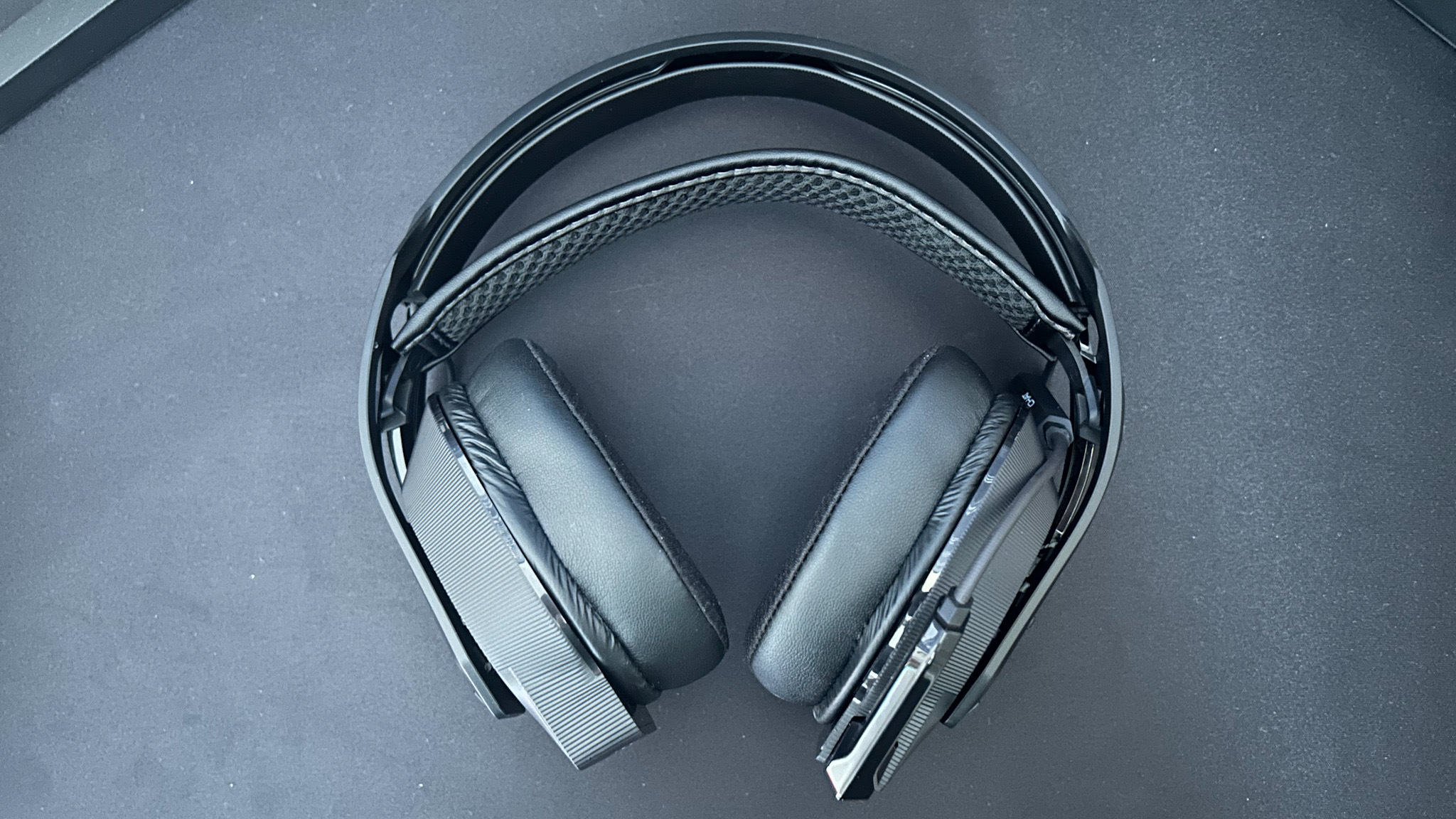GamesRadar+ Verdict
The Nacon RIG 800 Pro HX is a supremely comfortable headset but it lacks the power to see it stand up to its contemporaries. Outdated ports, no Bluetooth, and less oomph behind the cups means it's difficult to recommend at full price - especially if you're not fussed about the handy wireless charging dock.
Pros
- +
Extremely lightweight design
- +
Comfortable build with cool temperatures
- +
Wireless charging dock at a great price
- +
Nice power in the bass and lower mid range
Cons
- -
Plastic materials do cause some concerns
- -
Outdated connections
- -
Compatibility limited to PS5 and PC
- -
Less impressive audio compared to others at this price
Why you can trust GamesRadar+
There are plenty of gaming headsets in the $150 / £200 price range. This middle ground feels bloated with serviceable drivers and comfortable cups, so it takes a lot to stand out. With its lightweight plastic chassis and included wireless charging dock, the Nacon RIG 800 Pro HS is certainly making a good case for itself.
Even in the upper pricing echelons, the best gaming headsets have to do something new to really bring them into focus. While the RIG 800 Pro HS brings those previously premium extra features down to a mid-range price point, though, the overall flavour is still rather vanilla. Between battery and comfort upgrades over the previous 700 model, and that handy wireless charging feature, though, there may be a spot for this 2022 release in your setup.
I took the RIG 800 Pro HS out for a spin across PS5 and PC, to see exactly how it compares to the rest of the PS5 headset landscape.
| Price | $149.99 / £199 / AU$299 |
| Connection | 2.4GHz |
| Driver | 40mm |
| Frequency response | 20 Hz - 20 kHz |
| Microphone | Flip to mute |
| ANC | No |
| Controls | Power, volume, mic volume |
| Battery | 24 hours |
| Compatibility | PS5 / PS4 / PC |
Design
- Plastic chassis makes for an extremely lightweight design
- Comfortable cups that stay cool
- Some durability concerns in smaller parts and accents
At first glance, it's difficult to tell whether the RIG 800 Pro HS is punching above or below its price tag in its design. Yes, you're getting that slick docking station previously only seen in particularly expensive sets like the Astro A50, but the all-plastic body with its dated angular shapes doesn't quite scream three figures. There's a vein of logic in this conflict, though. While the cheaper build materials don't look like the slick metallic headpieces of 2023's hit list, they make for a supremely lightweight body. I did feel like I was wearing a cheaper gaming headset when I first donned the Pro, but after a while that melted away as I was left to enjoy particularly long sessions without even feeling the cups around my ears.
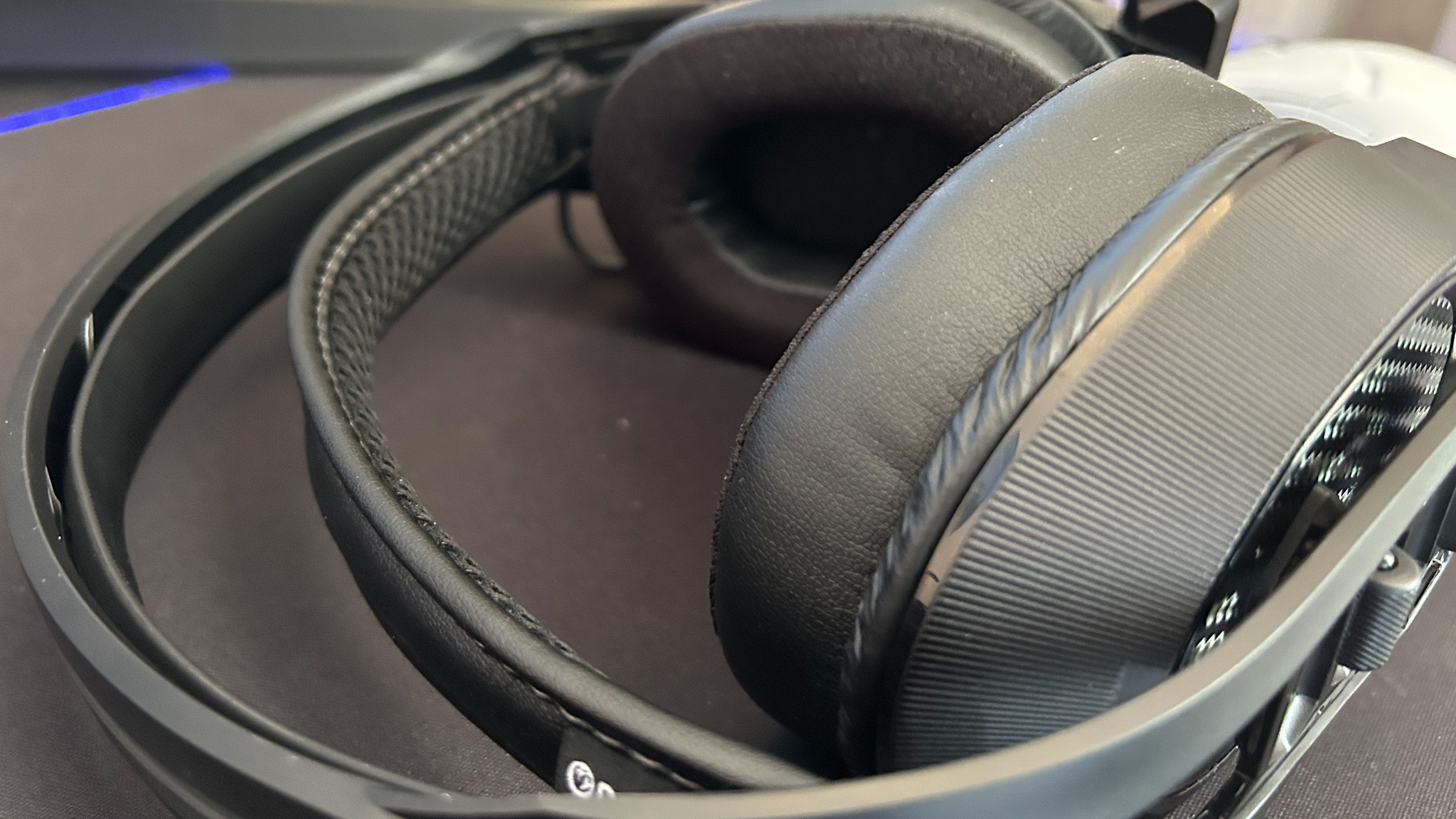
The faux leather earcups gently hug the contours of the ears, offering plenty of cushioning while still remaining cool. Meanwhile, a ski-style headband (new for the 800-Series, the 700s simply padded the main band) protects the crown from the harsh plastic frame. I rarely get on with this headband style - often the pressure from the stretched elastic feels more uncomfortable than the solid presence of a more cushioned body. However, there's just the right amount of flex in here to perfectly buffer the head from any harder materials.
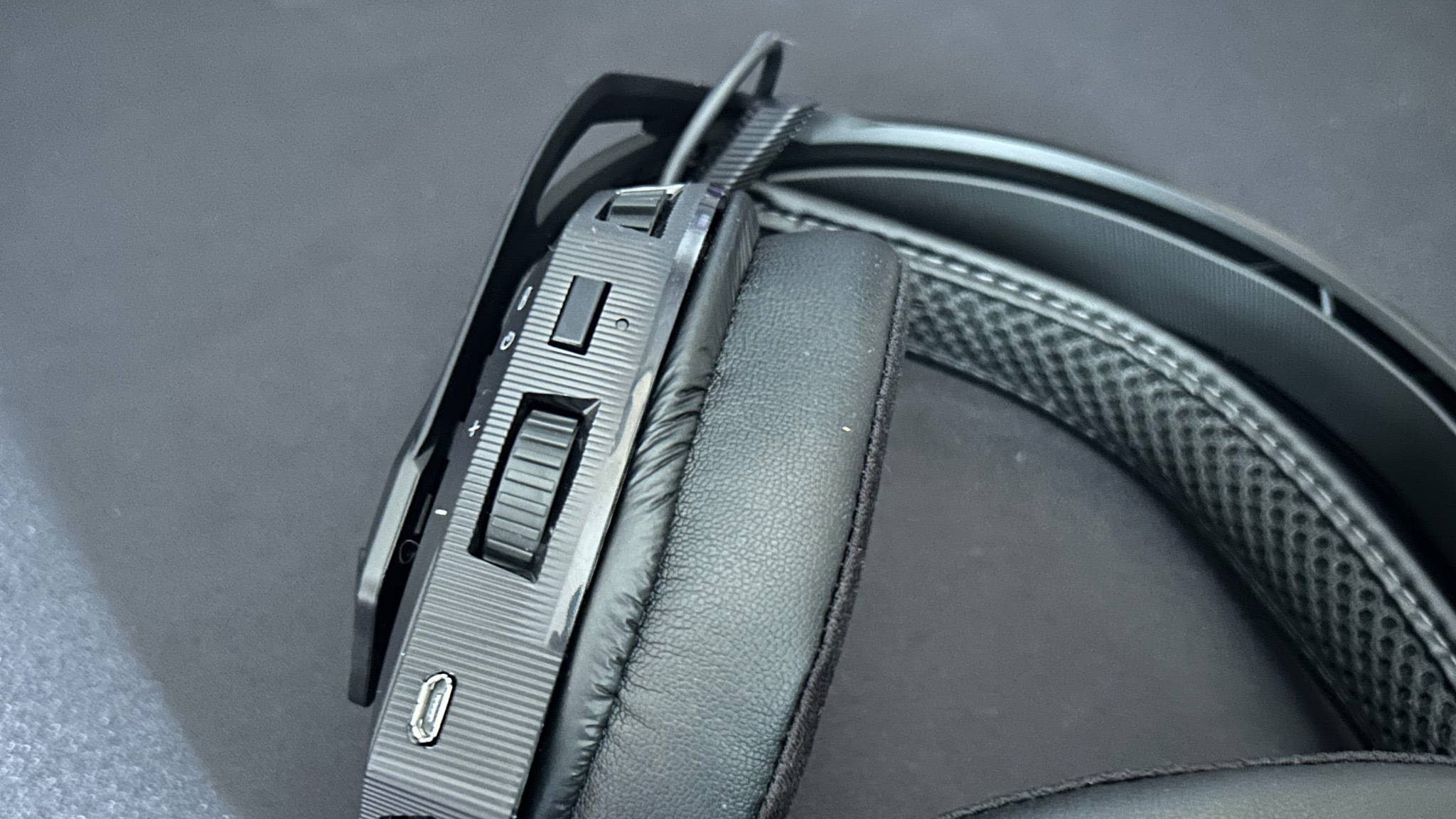
Still, the design isn't up to the standard of other similarly priced headsets. The scroll wheel controls on the left cup are far from precise, refusing to budge under slight pressure and then zooming up the scale as soon as more is applied. A second layer of the inner cup is covered in a creased, slightly loose leatherette material, seemingly holding on to a set of threads for dear life. Adjusting the overall size requires some nerve-inducing creaking and heaving of a small plastic nub through three hexagonal holes.
I wouldn't go so far as to call the RIG 800 Pro flimsy. Just the opposite. fact, I was surprised by how durable this thin plastic chassis seemed to be. Even smaller accents didn't wobble or flex during more intensive handling, and it would take more force than expected to actually do some damage here. However, it doesn't have the reassuring solidity that many of the top runners offer - everything seems robust on day one straight out the box, but I would still feel worried throwing it in a backpack if I wanted a few years out of it.
Features
- Wireless charging dock is handy but integrated 2.4GHz port is less so
- USB-A and Micro USB ports are outdated
- Limited to PlayStation and PC connection - no Bluetooth or 3.5mm
There aren't too many extra features keeping the Nacon RIG 800 Pro HS from its main job. In fact, that wireless charging dock is pretty much the only additional bonus packed onto these 40mm cups. With a slick design and reliable drop-in connection, it works beautifully and will certainly come in handy for those who don't like keeping a wire floating around to plug into every night.
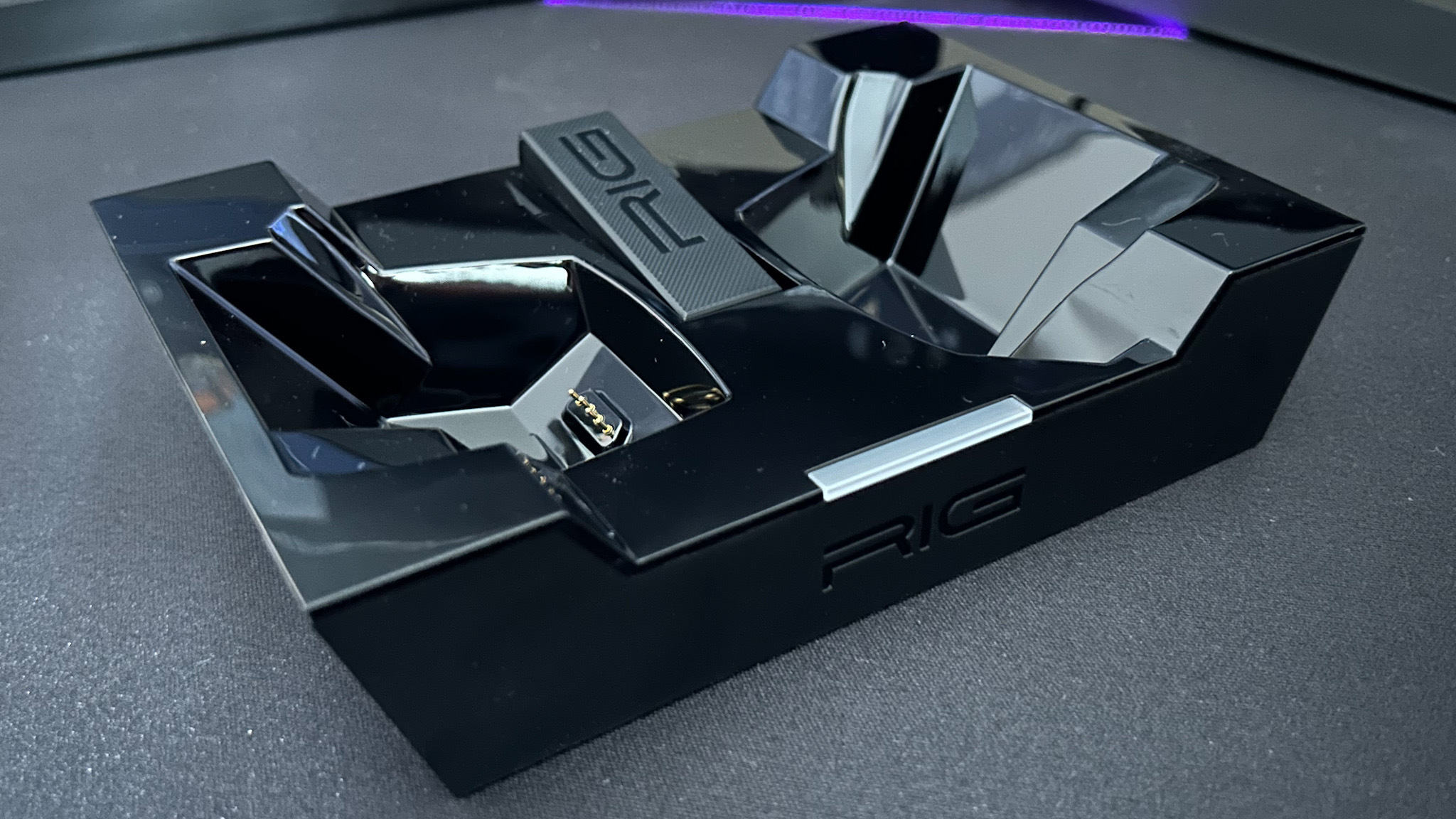
There's a spot to house the USB-A receiver as well, while connecting the dock itself to your console or PC, so that you can keep everything contained. I used the setup in this way for the first week of testing, though, and realized that my headset was only then charging when the PS5 was in Rest Mode (which I rarely use overnight) or when my PC was left on (I use a gaming laptop setup, so this is also rare). If you want continuous charging, though, you can always plug into a wall outlet and use the USB-A receiver directly on the device.
It's that USB-A and, more crucially, the micro-USB connection to the actual dock / headset that once again causes the RIG 800 to fall behind its competitors at this price point. Without a Bluetooth connection or a USB-C 2.4GHz dongle, connectivity is severely hampered. Unlike the cheaper Razer Kaira, for example, you won't be able to use the Nacon with Nintendo Switch or mobile devices. If you're sticking to PlayStation and PC (if you're after an Xbox Series X headset, opt for the HX variant), though, there's no harm done.
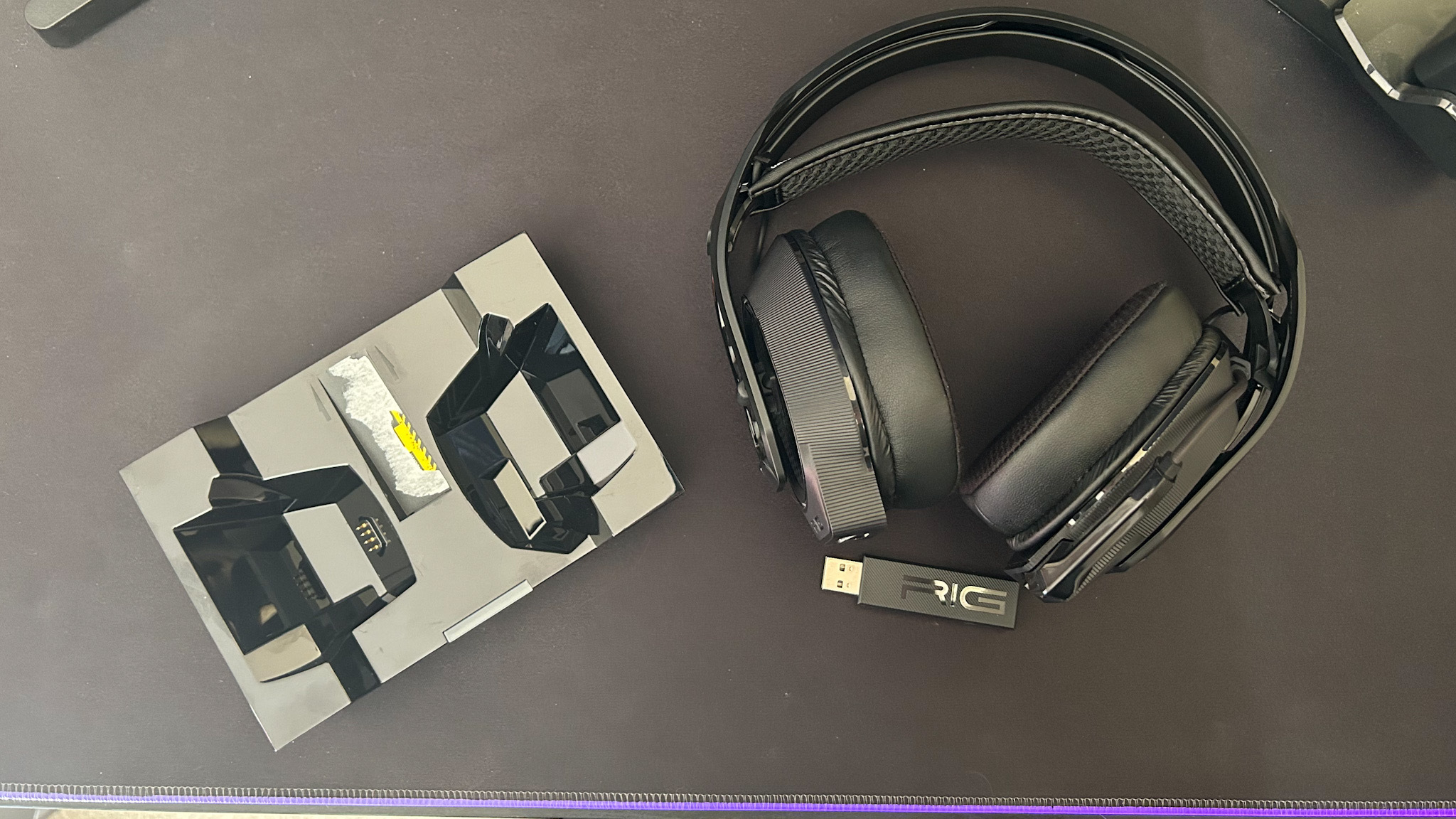
The dock doesn't provide any additional features aside from providing charging capabilities and the optional connection to your device of choice. At this price point, that's to be expected - there are options that add EQ settings, quick switches, and dual-connections through a hub / dock system, but they're usually well over $200 / £200.
Under the hood, everything is as you would expect. The cups themselves are formed from 40mm drivers which prioritize lower frequencies with a flip to mute mic winding its way from the left cup with a particularly flexible arm.
Performance
- Commendable bass and mid-range power
- Flattened in the higher ranges
- Less detailed and textured than contemporaries
I'll get it out the way first: the Nacon RIG 800 Pro HS isn't going to blow anything out of the water. This is a decidedly ok arrangement. I did value the nice balancing in the lower ranges, with plenty of power to keep everything impactful without bleeding over into higher ranges. Doom Eternal benefitted from this on PC, with a roaring bassline that managed to hold up well compared to more expensive headsets.
That's difficult to accomplish on a cheaper device, sitting within a price point that will often see swathes of bass-boosted headsets crackling their way through a gunfight. The higher mid and top ranges are flattened compared to more open soundscapes (like that of the Audeze Maxwell I've adopted as my daily driver), and overall there's a lack of detail compared to the RIG's contemporaries. Directional sound is admirable - I was easily able to pinpoint the screeches of clickers in The Last of Us Part 2 and it kept me on my toes in CS:GO as well.
The audio performance doesn't let the Nacon down, it's just simply nothing special. It provides solid audio that will keep you immersed in single player games and nifty on the multiplayer battlefield. There are plenty of headsets out there with soundstages that pack a more textured punch at a similar price, though. The Razer Kaira feels just that little bit more rounded with its larger 50mm drivers, which is concerning considering Razer's entry is significantly cheaper.
Should you buy the Nacon RIG 800 Pro HS?
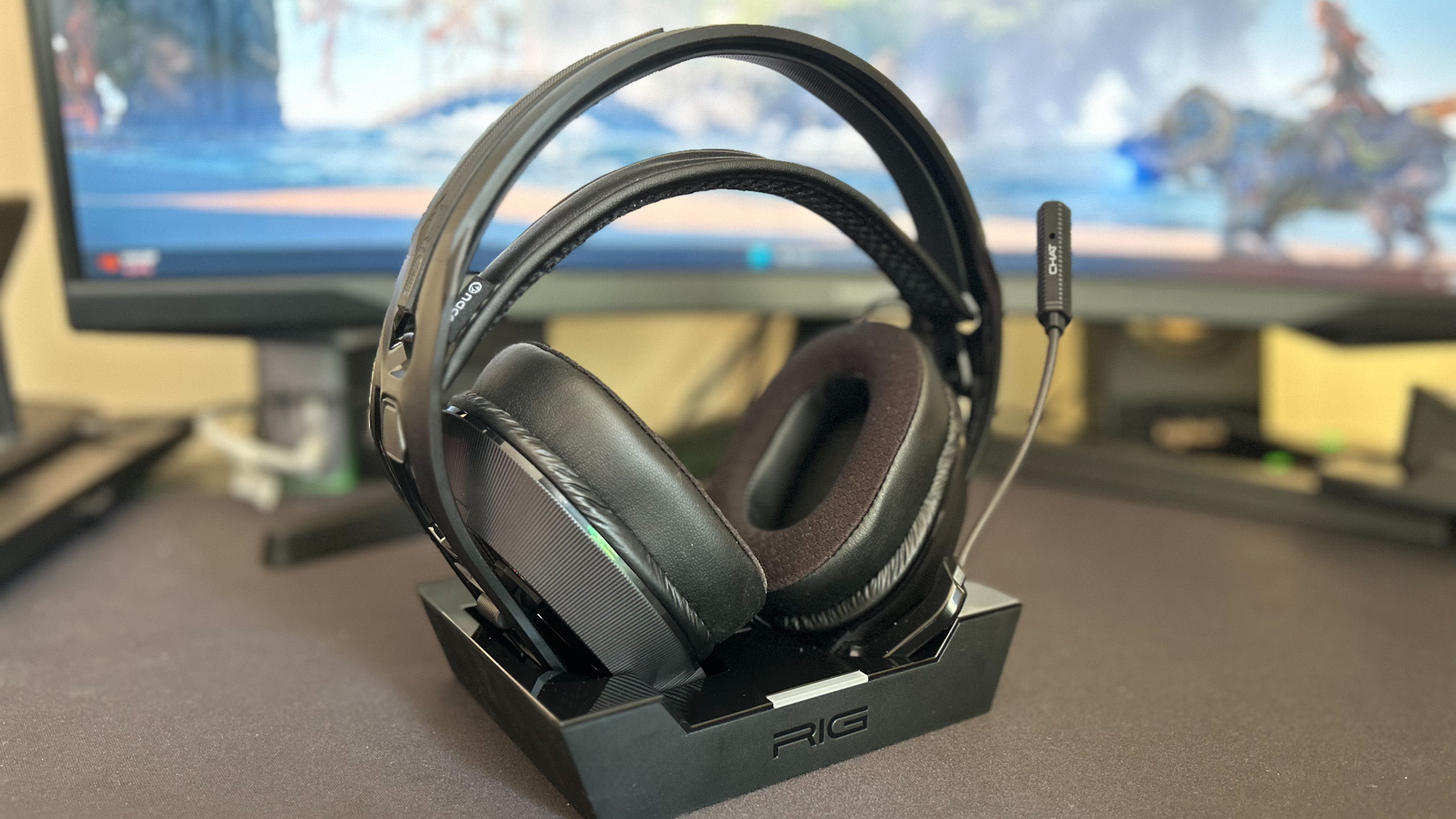
The Nacon RIG 800 Pro HS has a few things going for it. If you're looking to make your life easier with a simple drop and charge system, this is going to be the cheapest way to get your hands on a wireless charging dock. Combine that with audio that will beat out cheaper headsets and a comfortable build and you can't go wrong. Throughout my testing, though, I couldn't help but keep half an eye on the Razer Kaira. Not only do I prefer the more defined soundstage of Razer's entry, but it comes with greater compatibility thanks to the Bluetooth connection and a boosted battery life - all for $50 / £100 less than Nacon's. There's very little to argue with there - if you're not sold on the ease of a wireless charging cradle I'd heavily recommend the Kaira instead.
If that limited compatibility is getting you down, though, I'd also recommend looking into the Turtle Beach Stealth 700 Gen 2 Max. You're picking up larger drivers again, a wider frequency response, 40 hours of battery, and some of the best cross-platform performance we've seen in a wireless gaming headset to boot. You're spending a little more in the US at $199.99, but UK punters can save £20 by opting for this model instead.
| Specs | Nacon RIG 800 Pro H | Razer Kaira | Turtle Beach Stealth 700 Gen 2 Max |
|---|---|---|---|
| Price | $149.99 / £199 | $99.99 / £99.99 | $199.99 / £179.99 |
| Connection | 2.4GHz | 2.4GHz / Bluetooth | 2.4GHz / Bluetooth |
| Driver | 40mm | Razer Triforce 50mm | 50mm Nanoclear neodymium |
| Frequency response | 20 Hz - 20 kHz | 20 Hz - 20 kHz | 20Hz - 22kHz |
| Microphone | Flip to mute | Unidirectional Cardioid | Flip to mute omni-directional |
| ANC | No | No | No |
| Controls | Power, volume, mic volume | Power, volume, mic volume, SmartSwitch / EQ, Mic mute | Power, volume, mic volume, Bluetooth, Mode |
| Battery | 24 hours | 30 hours | 40 hours |
| Compatibility | PS5 / PS4 / PC | PS5 / PC / Nintendo Switch / Android | PS5 / PS4 / Xbox / PC / Nintendo Switch / Mobile |
How we tested the Nacon RIG 800 Pro HS
I used the Nacon RIG 800 Pro HS for two weeks, running the headset for all daily play and work while briefly testing against the Razer Kaira. In that time I was primarily hitting The Last of Us Part 2 on PS5, with the start of Horizon Forbidden West: Burning Shores thrown in. Over on PC, I tested using Doom Eternal, CS:GO, and a run through of Everybody's Gone to the Rapture. For more information on how we test gaming headsets, check out the full GamesRadar+ Hardware Policy.
We're also rounding up all the best Nintendo Switch headsets and best Xbox One headsets if you're after more console options. Or, take a look at the best PC headsets for gaming for a more desk-based solution.

Managing Editor of Hardware at GamesRadar+, I originally landed in hardware at our sister site TechRadar before moving over to GamesRadar. In between, I've written for Tom’s Guide, Wireframe, The Indie Game Website and That Video Game Blog, covering everything from the PS5 launch to the Apple Pencil. Now, i'm focused on Nintendo Switch, gaming laptops (and the keyboards, headsets and mice that come with them), PS5, and trying to find the perfect projector.
